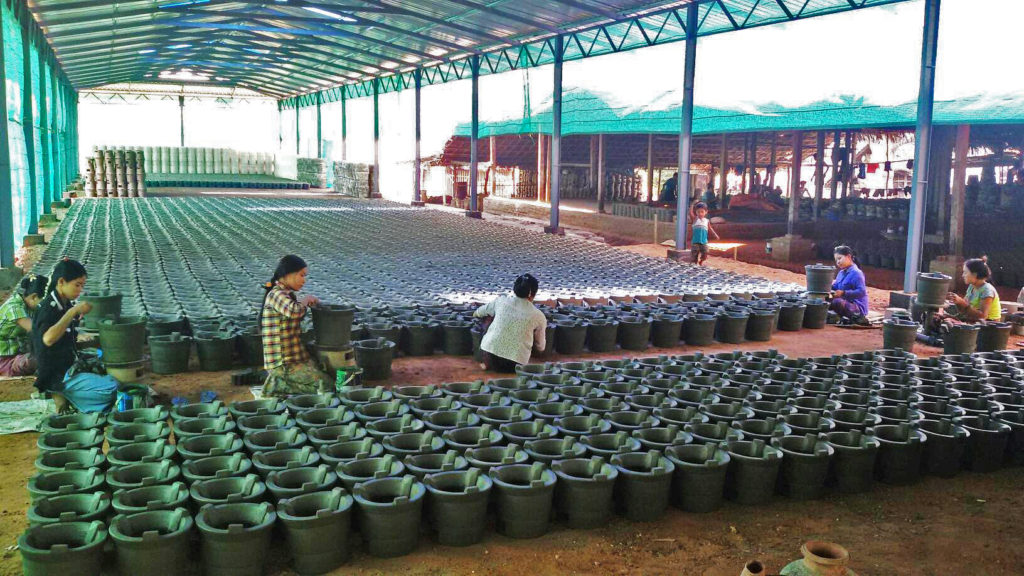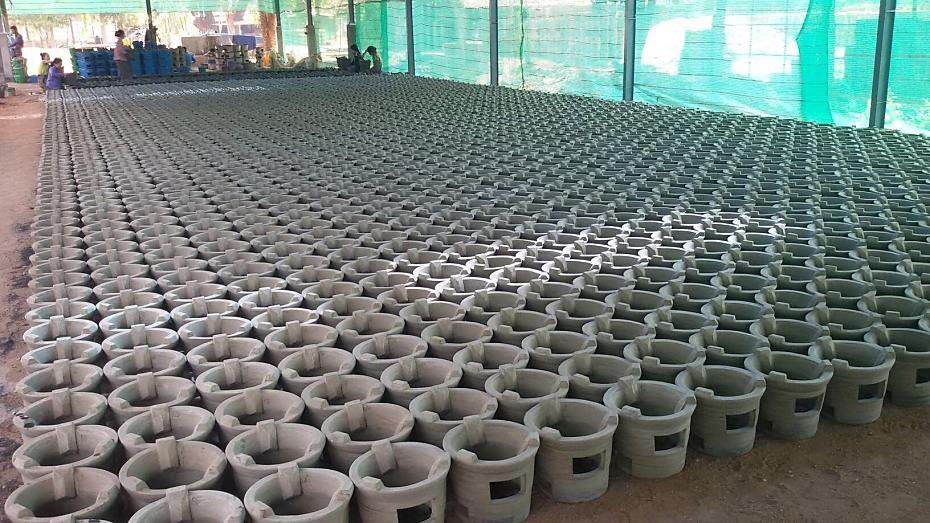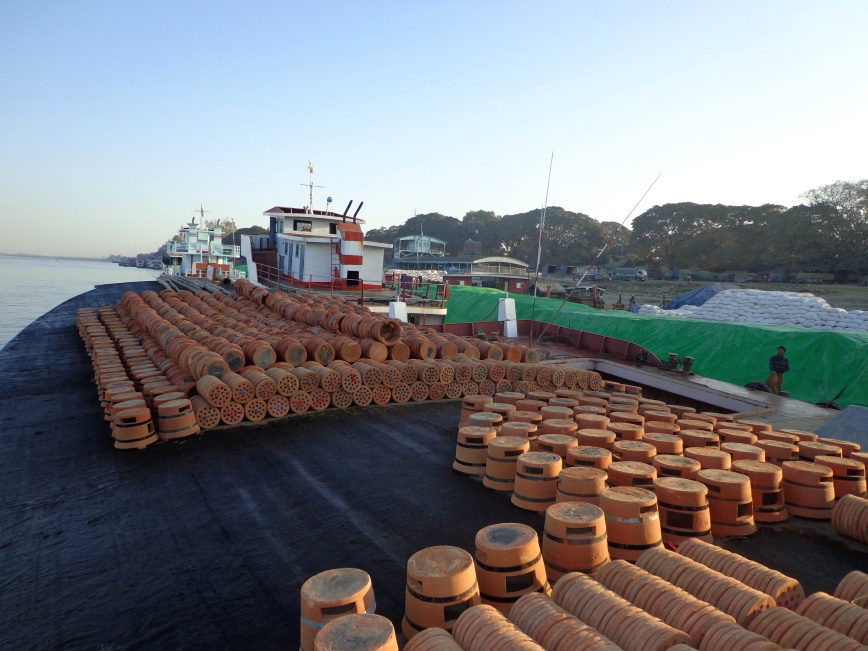Myanmar Myay Industry (MMI)
Myanmar Myay Industry (MMI) was founded in 1999 with the goal to mass produce low-priced standard quality stoves with high efficiency utilization. If every household in Myanmar used fuel efficient stoves (FES) instead of fuel wasting traditional stoves, Myanmar would be able to save wood-fuel and stop deforestation. With the help of EcoDev Group, a leader in community-led natural resource management and sustainable livelihood development in poor rural communities in the dry arid area of middle Myanmar known as dry zone, MMI conducted a feasibility study to mass produce FES. After that, MMI built a stove factory in Minbu Township and developed and implemented a new manufacturing process for producing the FES in large quantities while more importantly, maintaining the stove quality for energy efficiency.
Innovation
MMI studied the appropriate technology to produce portable and durable fuel efficient stoves (FES) with uniform physical dimensions, high fuel-saving thermal efficiency, and good insulation body composition. Three areas of study were carried out in order to produce user-friendly, high-efficiency, durable, portable, and low-priced FES for everyday household use.
The first study was done to develop improvements to the existing A-1 FES designs in order to maximize the efficiency of the stove. The second was to determine an industrial processing method for uniform and standard quality FES production. The third study was to develop an energy efficient kiln design to produce FES by using renewable energy.
Stove Body
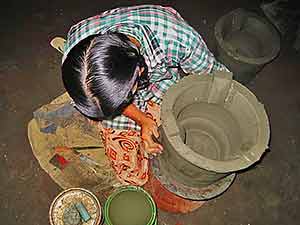 MMI improved the performance of A1 stoves by utilizing scientific principles in a redesign of the stove body. The redesign remixed material ratios to better insulate the combustion chamber of the stove, thereby minimizing heat loss and attaining a high temperature inside the chamber which promotes more complete combustion. Moreover, the remixing of raw materials not only controls heat loss but also strengthens and lightens the stove body. This is a great advantage for transportation of stoves because a lighter-weight stove is easier to transport and also for natural resource preservation since an efficient stove uses less firewood.
MMI improved the performance of A1 stoves by utilizing scientific principles in a redesign of the stove body. The redesign remixed material ratios to better insulate the combustion chamber of the stove, thereby minimizing heat loss and attaining a high temperature inside the chamber which promotes more complete combustion. Moreover, the remixing of raw materials not only controls heat loss but also strengthens and lightens the stove body. This is a great advantage for transportation of stoves because a lighter-weight stove is easier to transport and also for natural resource preservation since an efficient stove uses less firewood.
Machine
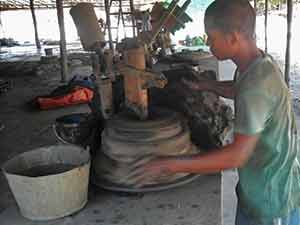 As a result of in-depth research conducted on industrial type manufacturing, MMI created and designed new machines and techniques for industrial production of its FES. These new machines incorporated improved molding techniques and design, mechanically designed throwing method, and industrial type mass production process.
As a result of in-depth research conducted on industrial type manufacturing, MMI created and designed new machines and techniques for industrial production of its FES. These new machines incorporated improved molding techniques and design, mechanically designed throwing method, and industrial type mass production process.
Energy Efficient Kiln
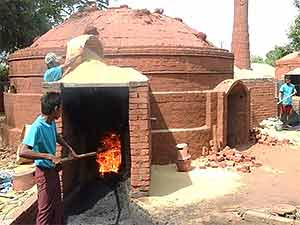 Most importantly, MMI innovated energy efficient kiln design to bake the stoves by using renewable energy such as agricultural waste of rice and peanut husks. This innovation is a great departure from other FES producers which rely on wood-fuel to produce FES, and thereby contribute to forest depletion.
Most importantly, MMI innovated energy efficient kiln design to bake the stoves by using renewable energy such as agricultural waste of rice and peanut husks. This innovation is a great departure from other FES producers which rely on wood-fuel to produce FES, and thereby contribute to forest depletion.
Production
To produce its FES, MMI chose a location with the most suitable clay deposit after testing sample of clay from different areas. MMI focused on locations in the Dry Zone in order to place production nearer to end users, dry zone dwellers. Believing that producing FES requires precision manufacturing with high quality control, MMI established the production process by introducing industrial based manufacturing using molding and throwing machines together with skilled labors. As a result, MMI reduces transportation costs for widespread distribution, and creates desperately needed jobs in the Dry Zone.
MMI has produced more than 600,000 A-1 FES since 2001 and has distributed most of them in dry zone areas and other part of Myanmar. At the moment, MMI has the capacity to produce 12,000 FES per month.
Dissemination
Our FES distribution plan is grounded on a social marketing approach based on user satisfaction and acceptance, which was developed in collaboration with EcoDev. Initially, MMI conducted FES demonstrations as a part of an awareness campaign in Dry Zone area of middle Myanmar. During demonstrations, villagers, especially women, observed the efficiency of MMI’s FES compared with traditional stoves and provided feedback. These focus groups became the core group of distributers and mobilisers within villages. MMI and EcoDev also jointly developed Information, Education and Communication (IEC) materials, such as posters and pamphlets, about FES and how to reduce wood-fuel consumption for everyday cooking. MMI also exhibited its FES at popular pagoda festivals in Dry Zone areas.
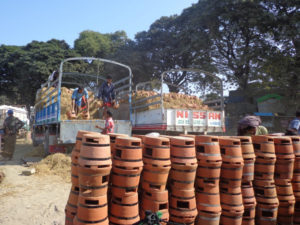 At first, MMI’s fuel efficient stoves were sold through women’s income generation programs and community national resource management activities led by EcoDev. Wide distribution has been very challenging for MMI as villagers are not accustomed to buying a cooking stove as they can cook meals if they have three stones. Most of them cannot afford to buy a stove at any price point. Therefore, MMI instituted a program to sell its FES on credit and directly distribute them to large numbers of villages and townships. Collecting money back took mostly a year for most of the case. Since 2000, in collaboration with EcoDev, MMI has developed a supply chain with potential retailers and wholesalers at the village and township level. It took almost 10 years to develop a sustainable marketing and sales system. Since 1999, UNDP and its partner projects, including the Dry Zone Greening Project of Myanmar’s Forest Department, have been the large distributors of A1 energy efficient stoves to its widespread project areas. Nevertheless, more than 70% of distribution goes to regular retailer especially in Dry Zone areas and all over the country.
At first, MMI’s fuel efficient stoves were sold through women’s income generation programs and community national resource management activities led by EcoDev. Wide distribution has been very challenging for MMI as villagers are not accustomed to buying a cooking stove as they can cook meals if they have three stones. Most of them cannot afford to buy a stove at any price point. Therefore, MMI instituted a program to sell its FES on credit and directly distribute them to large numbers of villages and townships. Collecting money back took mostly a year for most of the case. Since 2000, in collaboration with EcoDev, MMI has developed a supply chain with potential retailers and wholesalers at the village and township level. It took almost 10 years to develop a sustainable marketing and sales system. Since 1999, UNDP and its partner projects, including the Dry Zone Greening Project of Myanmar’s Forest Department, have been the large distributors of A1 energy efficient stoves to its widespread project areas. Nevertheless, more than 70% of distribution goes to regular retailer especially in Dry Zone areas and all over the country.

